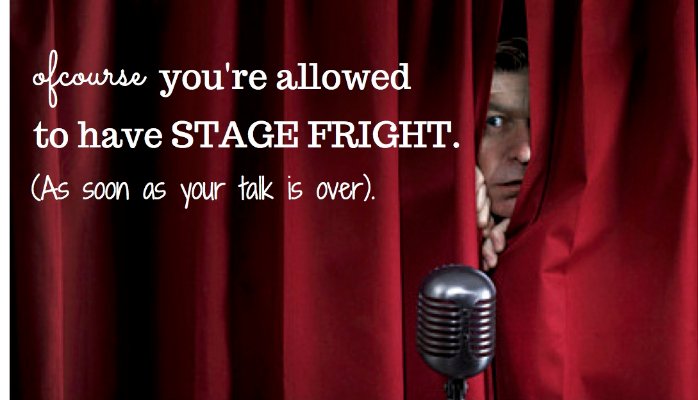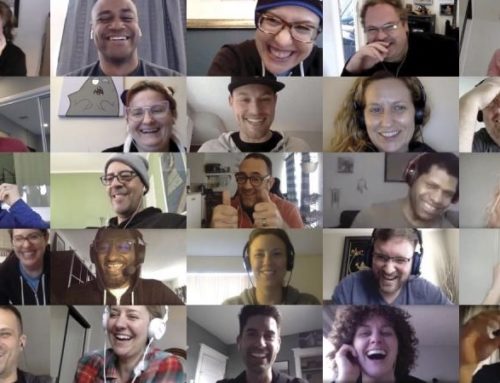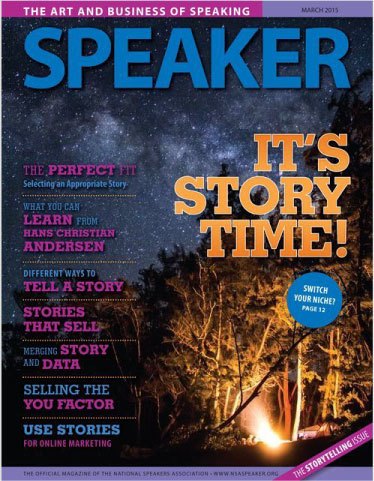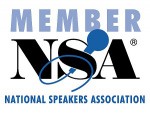
Last week I shared a post on the fact that Even Stars Get Stage Fright. Afterward I received dozens of requests for more tips on handling presentation nerves. Plus, a few folks sent me tricks of their own. It’s a rich topic, so here we go:
Smile!
Smiling is a simple, but powerful way to manage nerves, reduce stress, and look more confident.
Wonderfully, research from Penn State University found a forced smile is equally as effective as a natural one! They also noted that smiling is contagious. When a person smiles, other people will smile back, putting everyone into a more positive mental state.
So, when you are feeling jumpy before the big presentation, remember to smile.
Harness the power of your mind.
Thoughts are things. What we tell ourselves—what we see in our mind’s eye—becomes our reality.
An Australian psychologist named Alan Richardson performed a remarkable study to prove the power of the visualization. He recruited volunteer students, divided them into three groups and taught them to play basketball. None of them had ever played before.
Group One practiced their free throws with the help of a coach every day for 20 consecutive days.
Group Two was the control group. They did free throws on the first and last days of the study, but they did not engage in any other additional practice.
Group Three also did free throws on the first day of research, but after that first ‘test’ throw, they didn’t touch a basketball again until the end of the study. In between they spent 20 minutes a day visualizing the perfect free throw.
The results?
Group One, the group that practiced every day, improved by 24%. Not surprisingly, Group Two, didn’t improve at all. But Group Three, the group that didn’t practice with a real basketball, but only visualized one, did almost as well as Group One. They improved by 23%.
Our minds are powerful. Use this to your advantage.
Visualize Success
Visualize yourself as a successful speaker. Imagine the audience leaping to their feet after you’ve presented. See yourself and calm and composed when standing on the stage.
This technique has helped many of my clients feel more powerful and more in control before a big presentation.
Imagine Being Confident
Another way to use the technique of visualization is to think of someone you know who is very confident. Imagine yourself stepping into their body. Be them. Play the role of them. Feel their confidence flowing through your own body.
I have a client who told me that before a big presentation he imagines being:
“…that guy that Leonardo DiCaprio played in Catch Me If You Can. Everyone believed that guy was a doctor and then a lawyer and then a pilot because he believed it. I figure if I pretend I’m confident like him, everyone will think I’m confident too.”
Picture Your Biggest Fan
A third way to use this technique is to think of a person in your life who gives you confidence and imagine them in the room with you when you step up to the microphone.
My grandmother passed away when I was 16, but she’s been with me at every audition I’ve ever done. I mentally place her next to the casting director. She just sits there beaming at me. Her love gives me the courage to keep walking into those rooms and face the possibility of rejection. I know she’s proud of me no matter the outcome.
Forgive yourself for not being perfect
Yet another way to use the tool of visualization is to conjure up the biggest mistake you could possibly make in public—tripping on your way to the stage, forgetting the name of your CEO or the new product you are there to launch, discovering that your fly is open—and then imagine yourself being able to move on and recover gracefully from the mistake.
Manage your inner critic
Reframe the voice in your head that is feeding your anxiety. If she/he is saying: “I’m so nervous, I hate presenting.” Turn that into: “Even though I’m nervous, I’ll be proud of myself for doing the best I can.”
Or if he/she is saying: “Everyone will think I’m boring.” Turn that into: “Even though I’m afraid I’ll be boring, I will concentrate on smiling and making eye contact to be more expressive.”
Practicing healthy self-talk will also help you recover from mistakes more gracefully.
Belly Breathing to trigger the relaxation response.
When anxiety hits our breathing rate changes. We instinctively start breathing into our upper chest with shallow, rapid breaths. This is the body’s way of preparing itself to deal real or perceived danger.
By consciously changing your breathing pattern you can interrupt and reverse the symptoms of the Emergency Response. You can, instead, stimulate the parasympathetic nervous system to calm yourself down.
Instead of breathing into your upper chest with rapid, shallow breaths, deliberately take slow, deep breaths that push oxygen into your lower chest and belly. This kind of breathing will slow the heart rate, decrease blood pressure, soften tight muscles and create a growing sense of ease in the body.
This is great video you can use to practice and master belly breathing:
Think of the audience as your friends.
Some people find it calming to socialize with the audience beforehand. My husband calls this: “doing the schmooze.” They are just people after all. Shake a few hands. Find out what they will be doing this weekend. Ask what’s on their mind.
Talking with people before your big moment will get you out of your own head. This can help focus your nervous energy before you take the stage.
Find a friendly face
Once you are on stage, find some friendly eyes in the audience and look at those people. Stop looking at the sour faces in the crowd.
And don’t assume that a sour face means you are doing badly. Maybe that person has a migraine because they drank too much red wine the night before.
Don’t let a negative looking person freak you out when it’s very likely their facial expression has absolutely nothing to do with you and your presentation.
Remember: the Audience wants you to do well.
Remind yourself that the audience wants you to succeed. They don’t want to come to the conclusion that they are wasting their time. They’re pulling for you to be great, so they can feel great about spending time with you.
Concentrate on making them feel comfortable. It’s not about you. It’s about how you can serve the group.
And finally, a follower of my posts wrote to say:
“Remember that the audience’s perception is their reality. If they can’t see that you are nervous, they don’t think you are. And if they don’t think you are, you aren’t!”
















